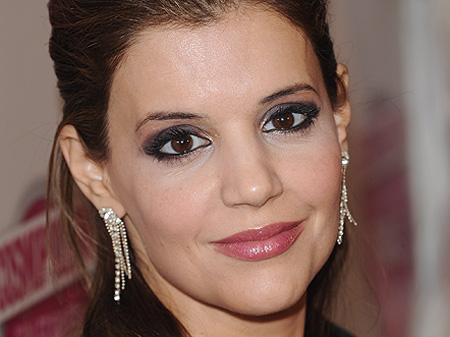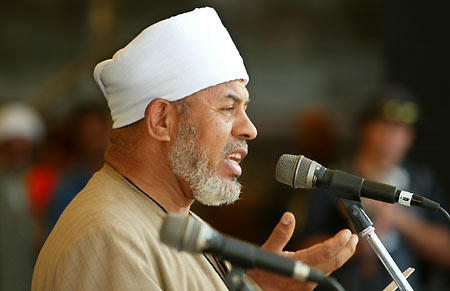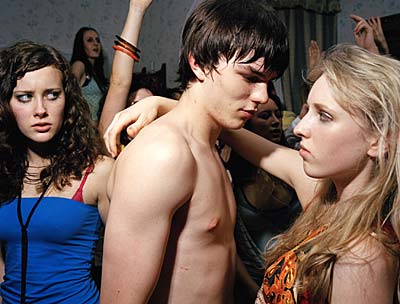|
 A new Home Office report blames the sexualisation of society for violence against women. It recommends a crackdown on the media, but Eamonn Dwyer wants to know why it didn’t suggest introducing the hijab. A new Home Office report blames the sexualisation of society for violence against women. It recommends a crackdown on the media, but Eamonn Dwyer wants to know why it didn’t suggest introducing the hijab.
Dr Linda Papadopoulos’ recent Home Office report into the Sexualisation of Young People spun the news cycle into overdrive. It’s got everything that pushes the public’s buttons: teenagers, sex and violence. Papadopoulos’ research apparently proved there was a ‘clear link’ between the ‘pornification’ of society, the sexualisation of children, and violence against women.
The report asks: ‘How have sex, sexiness and sexualisation gained such favour in recent years as to be the measure by which women’s and girls’ worth is judged?’ Apparently this is a recent phenomenon. Papadopoulos says the ‘widely held view is that the ‘sexualisation of culture’ is a sign of cultural degradation’, and she duly sets out a number of tough measures to roll back Britain’s cultural malaise. Boys under 15 should be stopped from buying Lads’ Mags. Sexualised public advertising should be governed by notoriously conservative local authorities. Sexy music videos should banned before the watershed.
That last measure would put every music channel out of business – except perhaps Gospel Hits, so long as it doesn’t play old Charlotte Church songs.
It was accepted uncritically across the political establishment. Alan Johnson patted himself on the back for commissioning it. David Cameron had already got wind of the report the previous Friday and condemned the ‘inappropriate sexualisation’ of children.
Someone who actually read the thing was Toby Young. He demolished the report’s ‘clear link’ between sexualisation and violence by comparing crime statistics with Papadopoulos’ conjectures. If access to pornography has massively increased, why hasn’t the number of sex crimes?
Young was courteous enough not to mention another obvious contradiction of Papadopoulos’ report: it warns that children follow the ‘social scripts’ of their parents, but the author - a mother of two - has made a career out of being a hot shrink you wouldn’t mind sharing a couch with. Do a Google Image search for Linda Papadopoulos. Plenty of pictures of her in low-cut tops, short skirts and seductive poises. In a recent GMTV interview, she showed up in a sheer top which revealed her black bra.
I’m not complaining; she’s a very attractive women. But Papadopoulos opens herself to ridicule through such flagrant hypocrisy when she condemns the pressures on women to look ‘sexy’ and ‘hot’ and be valued for their looks.
With a similar canny media sensibility, Papadopoulos tackles tabloid headline after tabloid headline in her quest for the evils of sexualisation. She expresses her deep concern about ‘sexting’, in which teenagers exchange nude pictures of each other via mobiles and the internet. ‘Young people themselves are now producing and swapping what is in effect ‘child pornography’ – a fact borne out by the growing numbers of adolescents that are being convicted for possession of this material.’ Rather than condemn the hysterical prosecution of naïve teenagers, she defines such acts as child abuse.
The government got what it wanted from rent-a-gob Papadopoulos: fuel for moral panic. They have made it a sexual offence for a 22 year old woman to have sex with a 17 year old work experience student if he works at the same company, yet if she meets him in a bar afterwards, it’s a no-crime. You are free to watch Straw Dogs on the telly, but if you are caught only taping the bits with Susan George, you can be put on the sex offenders register for owning violent pornography.
In linking sexualised culture with violence, the report represents the nadir of New Labour’s reactionary sexual conservatism. Ironically, it brings them alongside their ideological foes.
 “If the woman is in her boudoir, in her house and if she’s wearing the veil and if she shows modesty, disasters don’t happen,” said Australian cleric Sheikh Taj Din al-Hilali in 2006. “If you take uncovered meat and put it on the street, on the pavement, in a garden, in a park, or in the backyard, without a cover and the cats eat it, then whose fault will it be – the cats’, or the uncovered meat’s? The uncovered meat is the disaster. If the meat was covered the cats wouldn’t roam around it.” “If the woman is in her boudoir, in her house and if she’s wearing the veil and if she shows modesty, disasters don’t happen,” said Australian cleric Sheikh Taj Din al-Hilali in 2006. “If you take uncovered meat and put it on the street, on the pavement, in a garden, in a park, or in the backyard, without a cover and the cats eat it, then whose fault will it be – the cats’, or the uncovered meat’s? The uncovered meat is the disaster. If the meat was covered the cats wouldn’t roam around it.”
While Papadopoulos is at pains to critique this male rape myth, she fashions her own version by linking provocative dress with sexual violence. She says that children wearing adult clothing have the effect of ‘normalising sexual violence’. This is part of her broader critique of the sexualisation of society, in which she argues women portraying themselves as sexual objects are more likely to be victims. In substance, there is little to distinguish her from Sheik al-Hilali.
In Islam, one of the bases for women wearing the hijab and the niqab is to allow them to be admired for who they really are. Uncannily, Papadopoulos recommends that women should learn to be admired ‘for their abilities, talents and values’, and not on sexual stereotyping.
Adam Curtis’ brilliant documentary The Power of Nightmares drew out the links between the American neo-conservatives and Qutb’s Islamist movement. Both were disgusted by the sexualised, consumerist society of America, and sought to bring a purity of moral values back to society. Papadopoulos likes to blame the media and technology industries for fabricating a sex-obsessed society. But the truth is they are responding to demand.
 We live in a consumption economy, where people derive not only their self-worth but their sense of identity from what they purchase and own. If children follow the social scripts of their parents, or their peers, then it’s not surprising they are obsessed with getting the trendiest branded clothing or the newest games console. We live in a consumption economy, where people derive not only their self-worth but their sense of identity from what they purchase and own. If children follow the social scripts of their parents, or their peers, then it’s not surprising they are obsessed with getting the trendiest branded clothing or the newest games console.
And it is teenage consumers who are defining themselves as being sexualised adults. One of the problems the BBC has faced creating content for teenagers is that none of them are watching it. Instead of tuning into their ill-fated Switch content brand, they’re watching Skins or The Inbetweeners on Channel 4. They can see their onscreen counterparts have sex, do drugs, dress fashionably, and swear. Ostensibly ‘adult’ shows, they provide advertisers with ready access to a tough-to-reach demographic.
When you give teenagers spending power, it’s not surprising they spend money on sex. This is what terrifies the political parties the most: in a consumption society, it doesn’t matter if you need to be old enough to vote. You just need to be old enough to spend.
It’s impossible to tackle the problems of gender inequality in a society based on materialism and consumption. That’s too much to expect from politicking press releases from an ailing Home Office administration. For a much more sensible, radical and largely ignored suggestion that would improve women’s lives, you can check out the New Economics Foundation’s report on a 21-Hour Week. It might not have sex, teenagers or violence, but it would be a step towards a society where men and women have the free time to define who they really are beyond the framework of wage slavery and consumption.
eamon.dwyer83@gmail.com
www.twitter.com/eamonndwyer
|

